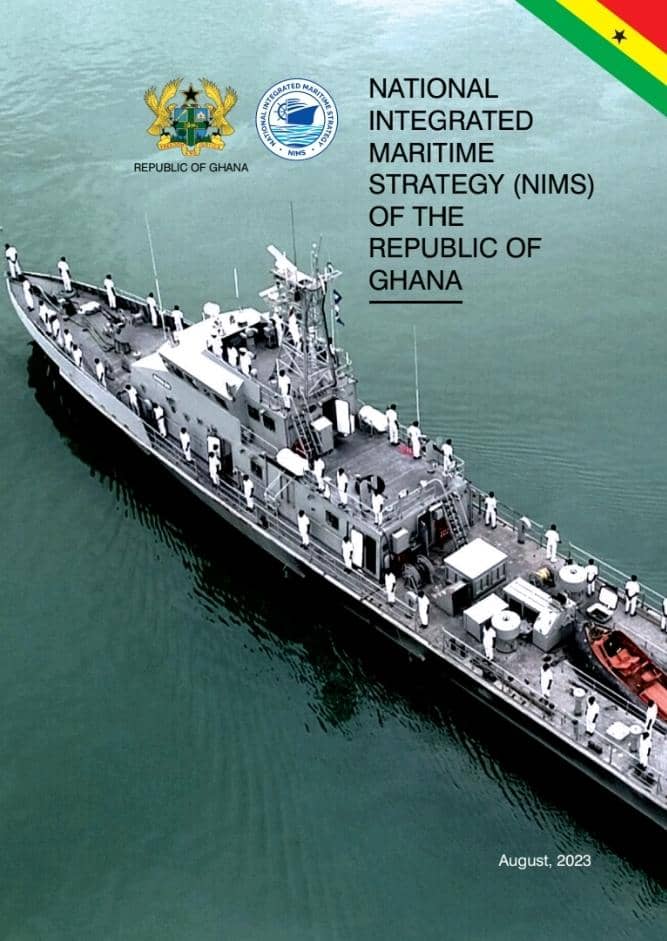In today’s shifting technological environment, artificial intelligence is increasingly being hailed as a strategic tool for improving maritime security.
In his remarks at the 3rd Saudi International Maritime Forum, in DHAHRAN, the Commander of the Naval Forces Central Command and U.S. 5th Fleet put this point more succinctly, as follows “Artificial Intelligence is foundational in our ability to locate, assess, and interdict bad actors hiding among the thousands of well-intentioned mariners just doing their jobs at sea.” For countries like Ghana, whose economic lifeblood is massively passed through maritime trade, AI is not really an asset but a need.
Ghana’s National Integrated Maritime Strategy (NIMS)
The National Integrated Maritime Strategy of Ghana is a wide framework designed to ensure the country’s maritime domain is safe. This coastal state is blessed with abundant natural wealth and possesses strategic ports but suffers from a series of threats such as piracy, illegal fishing, smuggling, and marine pollution. NIMS highlights interagency cooperation, regional collaboration, and the utilization of technology in solving these challenges.
The integration of artificial intelligence can make a big difference in how NIMS is implemented. In the context of maritime surveillance, the integration of AI through the analysis of data derived from satellite imagery, drones, and Automatic Identification Systems (AIS) detects anomalies and predicts illegal activities that enhance the response times of the relevant authorities in consonance with NIMS. The integration of AI can make a big difference in how NIMS is implemented.
Future Maritime Strategy in an Age of AI
Looking beyond NIMS, Ghana needs to prepare for a future in which AI will be one of the most important aspects of maritime strategy. A future Maritime Strategy for Ghana should incorporate the following pillars:
Advanced Surveillance and Monitoring:
AI can revolutionize the concept of maritime domain awareness since it can analyze big datasets to identify patterns related to illegal activities. Machine-learning algorithms could, for instance, predict routes taken by smugglers or monitor fishing activities to detect violations of maritime laws.
Cybersecurity for Maritime Operations:
With increasing digitization in maritime operations comes the growing threat of cyber-attacks. AI-driven cybersecurity tools can protect critical infrastructure in Ghana’s maritime, ensuring the integrity of port operations and safeguarding sensitive data.
Autonomous Systems:
Ghana will research the use of AI-driven autonomous vessels and drones in patrolling its EEZ. These systems can operate in hazardous conditions, reducing risks to personnel while expanding surveillance capabilities.
Capacity Building and Training:
The effective integration of AI in maritime operations demands competent personnel. That means investing in the training of maritime professionals in AI and data analytics to develop a workforce that can bring out the best in these technologies.
Regional Cooperation:
Maritime challenges normally spill over national borders. In this line of argument, the future strategy for Ghana should emphasize cooperation with regional bodies like the Gulf of Guinea Commission and the Economic Community of West African States (ECOWAS) in sharing AI resources and intelligence.
Economic Implications of AI in Maritime Strategy The role of AI in maritime strategy is, however, not limited to security. On the contrary, by increasing port efficiency and enhancing the flow of logistics, AI can further entrench Ghana’s position as a hub in West Africa. Predictive analytics would further optimize shipping routes, reduce turnaround times at ports, and increase the competitiveness of Ghana’s maritime sector. Similarly, AI-driven initiatives may help in sustainable fisheries management to ensure that Ghana’s marine resources are safeguarded for future generations. It has been indicated by international commitments to sustainable development and the Blue Economy agenda.
Conclusion
As Ghana goes about the business of operationalizing the National Integrated Maritime Strategy, planning for a future with AI at the core cannot be overemphasized. By harnessing the transformational power of AI, Ghana will be able to improve maritime security, stimulate economic growth, and become one of the leaders in maritime innovation in Africa. In Vice Adm. George Wikoff’s dictum lies a universal truth: in the age of artificial intelligence, those who adapt and innovate will be the ones to thrive. Now is the time for Ghana to embrace AI in its maritime strategy.
==============
Dr Osei Bonsu Dickson is a Senior Fellow at the Gulf of Guinea Maritime Institute,
CIMA World Fellow, and Guest Lecturer, at the Ghana Armed Forces Command and Staff College






